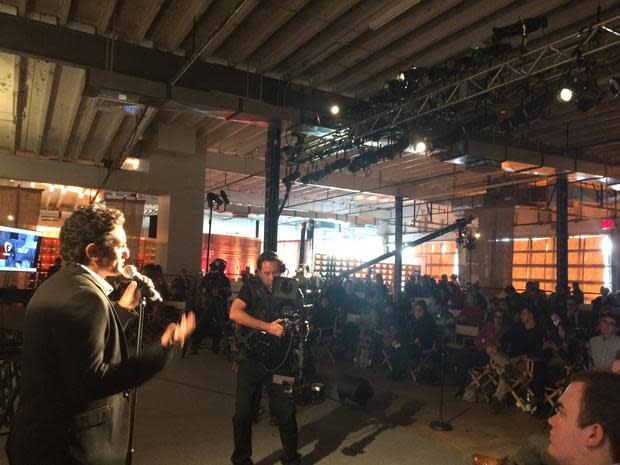Old challenges and new horizons for networked activism

Image: Fusion Networks
It's no secret that there's a lot of foment around frustrated young people, social media, activism, and government today. It's rare, however, to see all of those elements come together in a single moment in front of you, as I did at the Fusion Network's RiseUp conference on November 19, 2014 in Washington, DC.
I'd been walking around the cavernous environs of the second floor of the renovated Union Market building for a couple of hours, enjoying the colorful vibe of a hybrid combination of a TV show, hip coffeehouse, and new media conference that felt utterly unlike the standard DC event, finally finding my way to a seat a dozen feet away from the set where veteran broadcast journalist Jorge Ramos was interviewing the US's ambassador to the United Nations, Samantha Power.
A few minutes into their discussion of international relations and activism, I heard voices rise up from the left of the set and saw three young women holding up signs start walking into view. They made no secret of their affiliation with Code Pink, or their message, which was that Power was supporting US military action overseas that they didn't like. As Power's security detail moved to intercept the young women and, I expected, to work with the conference security guards to have them removed from the set, something unexpected happened instead: Ramos asked the two men not to push them and to let the women speak. He told them that he was listening, and that we, the audience, were listening. Each woman read a short statement, Power responded, and then the activists were allowed to remain standing, off to the side, as Power and Ramos moved on to finish the rest of their conversation.

Code Pink protesters behind Samantha Power and Jorge Ramos at RiseUp.
Image: Alex Howard/TechRepublic
As the interview ended, a Greenpeace activist next to me exclaimed that that was amazing, commenting that usually, protesters who do that get dragged away, instead of being recognized and then subsequently being interviewed by the journalist whose interview they'd interrupted. Code Pink got their meta media moment, shifting coverage from whatever Power said about the Middle East or Ukraine or other issues before the UN to how millennials feel about deploying US troops to Iraq again. Fusion also successfully navigated a delicate balance: in an event hosted by a network focused on young people that featured stories of millennials advocating for social change by using new media and technology to speak truth to power, simply censoring the young women by removing them would have been its own story. I don't think it's a story that would have been possible in many other venues, or many other countries, which left me feeling a bit proud.
During her conversation with Ramos, Power asserted that it's obvious that social media has enabled many more people to express themselves and connect to others. What shifts in technology have also done, she said, is enabled people to look around and see how many people share their views. In repressive societies, those views might have been trapped in silent thought bubbles about wanting to change government. Today, when young people reach a level of despair over unemployment or corruption, they're risking their freedom, lives, and health to go out and protest those conditions.
Much of that conversation or the conference did not mean I was left with warm and fuzzy feelings about the intersection of activism and technology. This was the same event, after all, that featured Wael Ghonim describing his experience of being beaten and detained by police for his part in the Egyptian revolution in 2011, along with stories from other people who'd faced abuse, surveillance, and detainment in response to their activism.

Wael Ghonim at RiseUp.
Image: Alex Howard/TechRepublic
Walid Al-Saqaf, a postdoctoral student at Örebro University in Sweden and former print and online journalist in Yemen, assessed the growth in use of social media and mobile devices in activism in countries across the Middle East and North Africa, where such access was limited before, as a net positive.
"Governments in the Arab world, and developing countries in general, have been lagging behind, because they don't understand how technology works," said Al-Saqaf, in an interview. "They are more or less reactive, unlike the case in some developed countries, such as Sweden, where I am, with extremely high penetration rates and well-educated officials who understand how to use technology. When you are reactionary, usually you overreact. If you find an article that's 'damaging national security,' you end up filtering it, and so you end up blocking access to many other kinds of content, depriving people of using those websites within a particular geographic region. That results in many people around the Arab world suffering from severe freedom of expression restrictions. The weak understanding of technology creates obstacles to human rights online. It also results in the struggle moving from the offline world to the online world: we already had issues offline, but now governments and civil society activists are beginning to interact online."
US Senator Cory Booker (D-NJ) was optimistic about what technology and media-fueled activism could accomplish, encouraging young people not to be cynical. Other predictions I heard at the conference were profoundly pessimistic. Technology is not only a force multiplier for liberation, but also for oppression, said Sascha Meinrath, founder of the Open Technology Institute at the New America Foundation. He said that the world is moving from the first "crypto war" from 20 years ago to a second one, where mobile devices in our pockets, homes, vehicles, and soon inside of our bodies are broadcasting information to places we don't know about and uses we can't see. He sees us on a trajectory to lose control over our information, who we are, and the stories told about us -- a bleak, dark future that without meaningful intervention is likely to occur.
What struck me, between the panels and conversations with attendees, is that there's now more maturity in conversations about the role technology, data, mobile devices, and social media can or should play in social change. Much of the technology-fueled optimism of years past has been balanced by revolutions that failed to produce stable democracies, revelations of government surveillance of these new media platforms, and the stubborn intransigency of inequality, broken justice systems, pervasive inequality, corruption, cynicism, and historic lows in trust in institutions.
In a thoughtful preamble before his panel at the conference, Alexis Madrigal, the Silicon Valley bureau chief for Fusion News, traced how we have moved from a decade where powerful industry executives and government officials suggested the internet could bring democracy to China to one where analysts recognize technology has enabled that authoritarian state to keep a firmer grip through baked-in censorship and surveillance tools. Today, the Islamic State of Iraq and the Levant use social media to spread video and images of the barbaric murders of journalists and aid workers to the world, routing around the efforts of media companies and government to black out their propaganda.
The narrative of "just add Internet" to create democracy has broken down, says @alexismadrigal. [yep.] #FusionRiseUp pic.twitter.com/CopqUs3fbj
-- Alex Howard (@digiphile) November 19, 2014
As Madrigal said at the RiseUp conference, many simple narratives have foundered in recent years, replaced by more nuanced conversations that look at the uses of technology within specific cultural, economic, and political contexts and constraints, evaluating how different tools have been used and to what effect. (On that count, I hope that documenting how mobile phones can be used to increase civic participation in participatory budgeting contributes to understanding how to successfully approach similar initiatives elsewhere.)
Three online projects to watch in 2015
There are fascinating new tools coming online that offer dramatically better forums for democratic governance than the current slate of social media platforms, which are all too often focused on getting attention and are supported by advertising business models, not collective action or civic participation. These are three projects that I'll be following in the year ahead.
First, Brigade Media is going to put something online next year. Dubbed "LinkedIn for politics," the startup will launch a new, consumer-facing "civic social network" sometime in 2015. Brigade president James Windon told me at the conference that Brigade hopes to connect people to shared values and meaningfully, collectively interface with existing parts of the political system. To that end, Brigade has been hiring many engineers. He says they want to fix what they see as the biggest problem facing democracy: people are no longer at the center of it. I'll have more to share on their enterprise in a future story.
On a local level, the work of Digital Democracy is also worth watching. The nonprofit is focused upon empowering marginalized communities in South America to use technology to defend their rights by teaching them how to use free and open source tools. They work within and with the communities to improve those tools. At present, their projects in South America are focused upon addressing environmental degradation through digital mapping software, and giving people the ability to create maps themselves. From mapping to monitoring to publishing the information, founder and executive director Emily Jacobi told me at the RiseUp conference that she is seeing an impact when communities have agency themselves.
For instance, after a community in Peru collected photography combined with GPS data, lawmakers from Lima traveled to the area in question and held the oil company accountable for spills. As more data from commons like OpenStreetMap go online, a new watchword in activism might be "think locally, map globally."
In 2013, a look at Loomio's open source deliberative software left Micah Sifry, who occasionally edits me at TechPresident, profoundly impressed. I think it's a more thoughtful approach to collaboration and decision-making than anything I've seen this year. In 2014, Loomio has been used in Greece and successfully completed a crowdfunding campaign that raised about $125,000 to fund further development of the software. At the Fusion conference, Loomio cofounder Ben Knight told me that their software now has some 50,000 users around the world, from Taiwan to Ukraine, and has been picked up for internal deliberations in multiple sectors, from schools to Wikimedia to the Wellington City Council. Knight expects the full release of the improved software by the end of 2014 and to start growing more; to this point, all of the pickup and adoption has been organic.
While the examples of governments using Loomio to co-create policies, laws, regulations, rules, or other community information have been thin on the ground to date, watch to see if that changes in 2015.
(Keep an eye on the growth of the Madison software, too, which recently received a huge grant from the Knight Foundation.)
It's going to be a fascinating year, as increasingly networked societies, journalists, and activists put pressure on institutions of all kinds, highlighting corruption, discrimination, and injustice.

 Yahoo News
Yahoo News 
